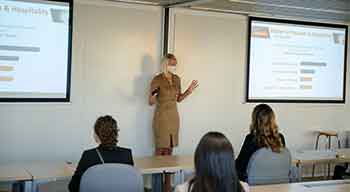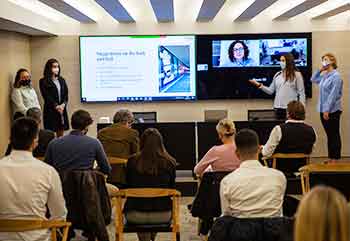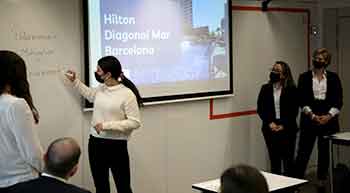EADA’s Master in Tourism & Hospitality Management is among the best in the world, according to Eduniversal
 EADA’s Master in Tourism & Hospitality Management has consolidated its position as one of the best programmes in the world. According to the latest ranking published by Eduniversal the 2021 Eduniversal Best Masters Ranking – Tourism Management, the master’s programme at EADA has retained its Top position in Spain and appears in the Top 10 worldwide, which is an improvement of 3 places compared to last year’s ranking.
EADA’s Master in Tourism & Hospitality Management has consolidated its position as one of the best programmes in the world. According to the latest ranking published by Eduniversal the 2021 Eduniversal Best Masters Ranking – Tourism Management, the master’s programme at EADA has retained its Top position in Spain and appears in the Top 10 worldwide, which is an improvement of 3 places compared to last year’s ranking.
Programme Director, Ulrike Jung, attributes this international recognition to several factors. The first of these is the focus on leadership, innovation and sustainability: “during the academic year, the participants develop key competencies in hotel management as well as skills in communication, negotiation, team work and leadership. They learn from industry experts about the most innovative trends applied in the most prestigious hotel chains. Participants also review aspects of the value chain relating to social impact and sustainability.
Employability is another important factor: participants usually find employment three months after finishing the master’s programme although this year it has been more of a challenge due to the major impact of the Covid-19 crisis on the industry. However, as Jung explains, “many people have taken advantage of the current situation to strengthen their competencies, broaden their knowledge and continue their personal and professional growth as well as prepare themselves for the new challenges the sector will face post-Covid”. The percentage of participants who would like to set up their own business in the sector or manage the family business has also increased.
A master’s programme connected to the business world
 Similarly, the practical focus of the programme has been a determining factor. The Master in Tourism & Hospitality Management at EADA is taught by professors and experts who are active in the sector. They relate their experiences to the participants as well as show them the latest trends applied to their businesses or best practices which have had success in other countries. According to the programme director, “this year, as a result of the pandemic, company visits have been replaced by online sessions taught by leading experts in the sector, such as Bernardo Cabot who is Area Managing Director in China for Melià Hotels, or the co-founder of eDreams, Mauricio Prieto. By following the methodology of immersive learning, all of the participants have been able to attend both online and face-to-face classes, with the maximum guarantees of health and hygiene. This practical focus is included in all of the projects that participants work on during the academic year, which are based on real cases. Jung explains that, “they all work as consultants, analysing the current state of the business and searching for creative solutions to real problems, which will be useful experience for when they become leaders in the business world”.
Similarly, the practical focus of the programme has been a determining factor. The Master in Tourism & Hospitality Management at EADA is taught by professors and experts who are active in the sector. They relate their experiences to the participants as well as show them the latest trends applied to their businesses or best practices which have had success in other countries. According to the programme director, “this year, as a result of the pandemic, company visits have been replaced by online sessions taught by leading experts in the sector, such as Bernardo Cabot who is Area Managing Director in China for Melià Hotels, or the co-founder of eDreams, Mauricio Prieto. By following the methodology of immersive learning, all of the participants have been able to attend both online and face-to-face classes, with the maximum guarantees of health and hygiene. This practical focus is included in all of the projects that participants work on during the academic year, which are based on real cases. Jung explains that, “they all work as consultants, analysing the current state of the business and searching for creative solutions to real problems, which will be useful experience for when they become leaders in the business world”.
For example, in the Marketing Challenge, they worked as consultants for the restaurant Tavolamica in Barcelona, which belongs to Catering Arcasa D.L. After 7 weeks, the participants, who were put into cross-cultural teams, had to present a marketing plan to optimise restaurant sales. “It was an excellent opportunity to apply everything they had learnt during the master’s programme and put their teamwork and strategic decision-making skills to the test in a challenging context such as today’s”.
Students also worked as consultants on the Sustainable Hotel Room project for the Hilton hotel chain. This time the participants were put into mixed groups with students from the EADA Master in Sustainable Business & Innovation. They analysed various innovative and creative solutions which they then presented to Joachim Hartl, who is the Area General Manager of Hilton in the Iberian Peninsula (including the Hilton Diagonal Mar in Barcelona). Jung points out that, “as in other sectors, the clients in the hospitality sector are becoming increasingly aware of the social and environmental impact of their actions. Becoming involved in a project of this kind for a prestigious chain like Hilton was therefore an opportunity to implement sustainable actions that have an impact on the whole business”.
 The sector is reinventing itself
The sector is reinventing itself
Tourism has undoubtedly been one of the most severely affected sectors due to the pandemic crisis. Many businesses have been forced to close and many professionals currently on furlough are unsure about their future. According to Ulrike Jung, “the businesses which have survived are those which have accelerated their digital transformation, while offering a safe service to their clients as well as looking after their employees. The situation required ad hoc measures and a lot of courage to come up with innovative ideas and rethink their business, such as the conversion of some hotels into hospitals for those people affected by Covid-19 or the switching to home delivery by many restaurants to be able to continue their activity”.
For Jung, “now more than ever it is very important to have an open mind, unlearn what you have learnt and come up with new business strategies, discover completely new business models, set up synergies with entities and associations, including your competitors, show resilience and flexibility and above all, continue to innovate”.
